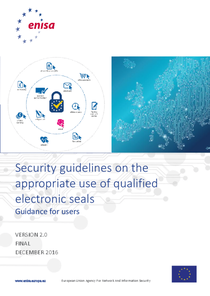Security guidelines on the appropriate use of qualified electronic seals
This document addresses qualified electronic seals and is one out of a series of five documents which target to assist parties aiming to use qualified electronic signatures, seals, time stamps, eDelivery and website authentication certificates to understand the subject correctly as-well-as the potential benefits, amongst others, by giving examples of possible application. This series of documents also targets to give those parties some advice on how to correctly use the related qualified trust services.
- Published
- Language
On July 1st 2016, Regulation (EU) 910/2014 (hereafter called the eIDAS Regulation), which lays down the rules on electronic identification and trust services for electronic transactions in the internal market came into force covering across Europe in all 28 Member States. It defines trust services for supporting electronic signatures, electronic seals, electronic time stamps, electronic registered delivery services and website authentication.
The eIDAS Regulation represented a big step forward in building a Digital Single Market as it provides one common legal framework for all parties relying or providing on those kind of services. Indeed, various sectors of the economy (e.g. finance, banking, transport, insurance, health, sharing economy, trading, etc.) where obligations exist for security, reliable identification, strong authentication, legal certainty of evidences, will clearly be positively affected by the eIDAS Regulation. This latter will indeed allow citizens, businesses and public administrations to meet such obligations for any (cross-border) electronic transaction as they will now be able to use the recognised eID means and (qualified) trust services. In particular, a qualified electronic seal shall enjoy the presumption of integrity of the data and of correctness of the origin of that data to which the qualified electronic seal is linked. When based on a qualified certificate issued in one Member State, it shall be recognised as a qualified electronic seal in all other Member States.
